I had my first conversation with the woman who is now my wife while serving her hot chocolate with soymilk and no whip cream at a coffee shop during my leave of absence from a Masters in bioengineering. I told her my career track was to be a rockstar, then she laughed, then I said I was serious. At the time I was full of confidence that I had a special musical sound for the world– objectively standout, good music…
But I kept getting close to big breaks only to see them lose steam, even as friends would get actual big breaks that landed them in Rolling Stone and the like. I was convinced that many of the underground musicians I had shared stages with were better than the top 40 artists who were household names.
I’m not frustrated anymore (or so full of confidence!) because making it in music is not about being objectively good after all. It’s about connecting with an audience, maybe because you’ve given expression to the grumblings of their spirit that need release (every artist’s aspiration) or maybe because your promoter pounded enough ears for enough time over the radio until the songs stuck (close enough, I’ll take it). If the music means something to me as a listener in my personal, idiosyncratic world, then it IS good (to me). It’s not as if “good music” is a universal, discoverable quantity floating in the ether.
Strangely enough, I picked up language for that realization through class discussions re: Erie Railroad v. Tompkins and Burnham v. Superior Court of California. In the first, we learned that there is no general federal common law, which is to say that Supreme Court justices can’t just make up criteria for decisions based on an objective, outsider point of view which is itself based on a supposed universal, discoverable code of justice. Justice Holmes famously dissented from a Supreme Court decision ten years earlier to make this point, and now the bench came around to his view in this case.
In the second, we examined Justices Scalia and Brennan going at each other in their opinions about why a traditional rule should be upheld re: a state court’s ability to enter a judgment against a particular defendant only passing through the state. Scalia called Brennan’s fairness arguments “just tradition masquerading as ‘fairness’” and Brennan (in essence) called Scalia’s tradition arguments a “patchwork of legal and factual fictions.” As much as fairness arguments hit my sweet spot, I concede to Scalia’s point that assessing fairness based on what a defendant can expect and rely on (i.e. not being surprised by being pulled into court) is really based on what normally happens. What normally happens is tradition, which Scalia is all about.
The argument goes deeper, though, and Scalia tag teams with Holmes here. Tradition is something concrete; fairness is either a universal, discoverable quantity floating in the ether or else, like the debunked concept of general common law, it’s just subjective policy preferences– and as the argument goes, the Supreme Court holding its policy preferences of fairness over those established in tradition is arbitrary. BUT maybe we can assess fairness in similar terms as, well, good music, in that it comes down to the people who listen to the tunes and live through the decisions. Does it work for everyday people and is there some way to measure that? Are we hearing their voices?
Fairness, truth, justice, good music– it might be that their realness lies less in their abstract certainty as in their effects as filters through which everyday people experience the world. It’s hard to say what fairness is, but it’s measureable to count who feels fairly treated and who doesn’t. I’d like to understand how to review tradition in that light so that applying fairness can be definitive and reproducible.


2 Comments
Yaminette posted on November 15, 2009 at 1:52 pm
“It’s hard to say what fairness is, but it’s measureable to count who feels fairly treated and who doesn’t.”
No one could say it better! WOW!
Samantha Rex posted on February 11, 2010 at 6:39 pm
Absolutely true and encouraging… viva la musica!